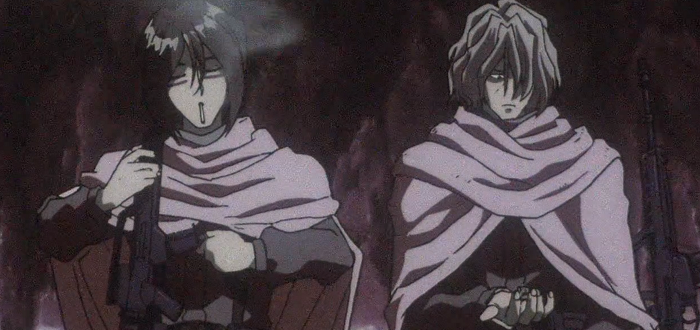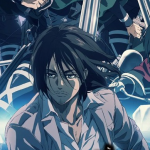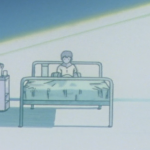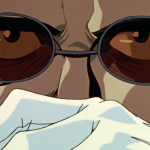Adios, Cowboy: Review 13 – Jupiter Jazz Part 2
Thirteen episodes. It took thirteen episodes for me to hit my limit on Cowboy Bebop throwing around its manifesto as an excuse for not telling a story. Yes, we get it, you want to be cool and different. You want to blow cigarette smoke in the face of your detractors. However, patience in the face of the avant garde is a two-way street. I expect a two-part episode to build to something other jazz hands presiding over an ersatz emotional coda and a hot mess that shoehorns the Bebop crew into someone else’s story. The line must be drawn here. This far. No further. This is a bad episode.
And for the love of all the gods, I don’t want to hear about how it will all make sense after I’ve seen everything. No. A series needs to have the strength to get a viewer from point A to point B on more than faith. Writers need to offer assurances that there is a vision. Writing that flouts the rules but basks in promises of being hip and different – so of course you should keep watching – is the worst kind of hipsterism. To quote a few of my ex-girlfriends, “This is about you, Adam Cowboy Bebop, not me.”
At this point, I have come to expect that Bebop is going to build its stories around other people’s conflicts. The role of the main cast is then to move through those conflicts and, seemingly, to come away unchanged for the experience. What’s insufferable is that Jupiter Jazz’s second movement shows how everything that happened in the previous episode was set dressing for the complex, but ultimately disposable, relationship between Gren and Vicious.
Worse still, if the episode was singularly focused on the relationship between Gren and Vicious, it probably would have stuck the landing. JJ the second spends a lot of screen time flashing back to how Gren and Vicious knew each other during “the war” on Titan. Yet this knowledge is delivered not as context not for the audience, but as insights for Faye. This pulls Faye back into contention as a point of view character and makes the episode’s first act a shared spotlight between Faye and Gren. While there’s nothing inherently wrong with the two characters sharing the stage, so to speak, Faye’s contributions are so badly crafted as to do nothing but get in the way of Gren’s story.
Case in point, after Gren explains his life to Faye she tries to shoot him. Recalling that the episode opens with a recap that captures the rapey vibe between Faye and Gren at the end of Jupiter Jazz’s the first, the attack might seem justified. However, at no point does the writing do anything with this implied threat. Even when Spike finds Faye bound and gagged in Gren’s bedroom, Faye is quick to explain that Gren is not that kind of guy.
So this means Faye tried to shoot Gren because of his proximity to Vicious? What? Why? Spike is the one with a score to settle with Vicious. Add to that the fact that Faye spent the entire previous episode saying how she didn’t care about the Bebop crew. Recall her lesson from Toys in the Attic: life is survival of the fittest. Even though Gren and the audience know Faye is working through some serious insecurity and denial about her relationship with the Bebop crew, it’s a hell of a leap to see her go from alienation to proxy-murder.
This utter mess of a first act then asks the audience to shift its sympathy to Gren as he goes about his plan for revenge against Vicious. Maybe if we weren’t working through the looming threat of sexual assault in Gren’s introduction we might be inclined toward such a pivot. There’s an entire story to be found in positioning Gren as a victim of the prison-industrial complex and of Vicious’ betrayal. Yet asking for this alchemy of audience sympathy while scant minutes prior the camera work and writing are in close orbit of Gren victimizing Faye is too much and too messy in its execution.
But amid these shambles there remains a lot to be seen in the story’s construction of “the war” on Titan as an “over there” experience. It becomes an effective proxy for how the west contextualized its wars in the Middle East in the latter half of the 20th century. They were far off things, removed from “civilized” places. This flashback further points to Cowboy Bebop not as Space Jazz but as Space Status Quo in terms of genre.
The tableau of Gren begging Spike to send him back to Titan, back to the place where he had comrades, is on point with the narratives of veterans longing for “over there” as the only place that makes sense. In these scenes, I can see where the blueprints wanted this story to end up. In that same moment, it’s also abundantly clear that the Bebop crew are ballast within this story.
It is as if Watanabe had a great idea for a story about Vicious, but then had to reverse engineer it into the conventional Cowboy Bebop formula. Instead of trusting the audience with a story about Vicious, Jupiter Jazz forces the “complex” threads of the last twelve episodes into a story that awkwardly connects Spike, Gren, Julia (Spike’s ex) and Vicious together. The results are a hot mess. Then, as is the Cowboy Bebop fashion, multiple one-off characters are killed as punctuation to the story.
Why? Why keep doing this? Why introduce characters just to kill them. Poor Lin, Spike’s former protégé now serving as Vicious’ answer to Wayland Smithers, shows up only to die. How much mileage could we have got from the interplay between protégé and mentors?
For all the effort this story puts into wanting the audience connect with Gren, it leaves his corpse drifting through space on a literal slow boat to Titan. Why? Because killing off space Smithers requires upping the emotional volume to include abandoning a body to drift through space.
I find myself wondering if the purpose of this show is to try and make the audience as numb and indifferent as the main characters. Is part of Space Jazz a long and protracted Voight-Kampf test? How maladjusted does this show think I am to keep hitting me with such persistent thematic ennui and alienation?
Cut to: the end title card that asks the audience, do you have a comrade?
Flashback to: Faye calling all hackers fat and lonely Otaku during Jamming with Edward as if to sneer at its own audience.
Ah, so that’s what it thinks of me.
Come on, Cowboy Bebop, you can do more than try and manipulate the audience into feeling things. Unless it can’t?
One need only look at Spike getting shot at the end of Jupiter Jazz part 1 to see that Bebop is singularly interested in playing toward the affective. Consider that neither Lin nor Vicious have any reason to believe that Spike is going to show up on Callisto. Yet somehow we are meant to believe that Lin, a hardened gangster who is utterly loyal to Vicious and Red Dragon, is packing tranquilizer rounds in his gun? Or should we presume that he somehow had time to switch out his lethal rounds for tranq bullets once Spike announced himself and drew on Vicious. Come on. I’ve cut this show a lot of slack for things like turning Titan, a literal ice moon, into a desert, but tranq bullets amid a fake out death scene is a bridge too far.
If this arc of Cowboy Bebop has a thesis, it now seems to be limited to observing how the present, as seen through this future, is sad. My response is to paraphrase Vjer and ask is there not more? Surely a show that people have talked about for two decades has more going for it than a mobilization of late 90s alienation and ennui. There must be more to this story than constantly playing for pathos before mashing the reset button to do it all again.
Consider this my litmus test for the rest of the series: I want to think things, not feel feelings.
See you in Arc 2.













